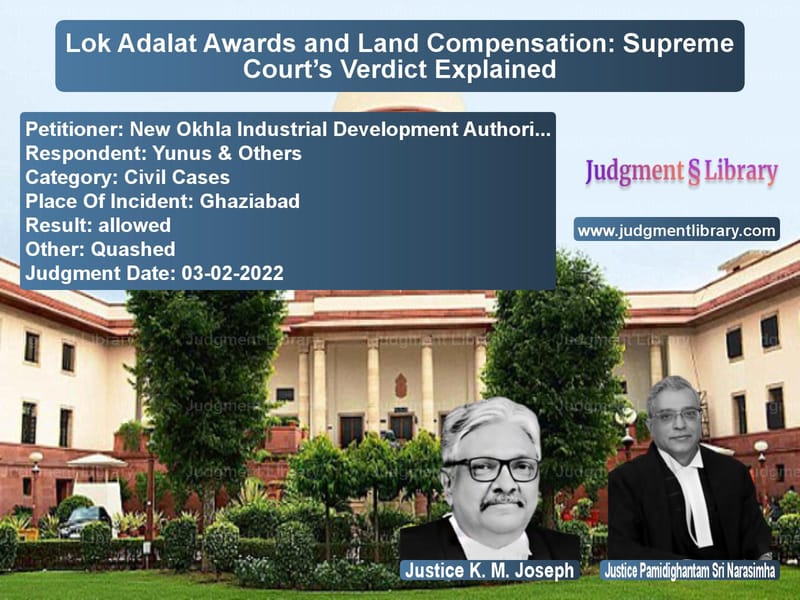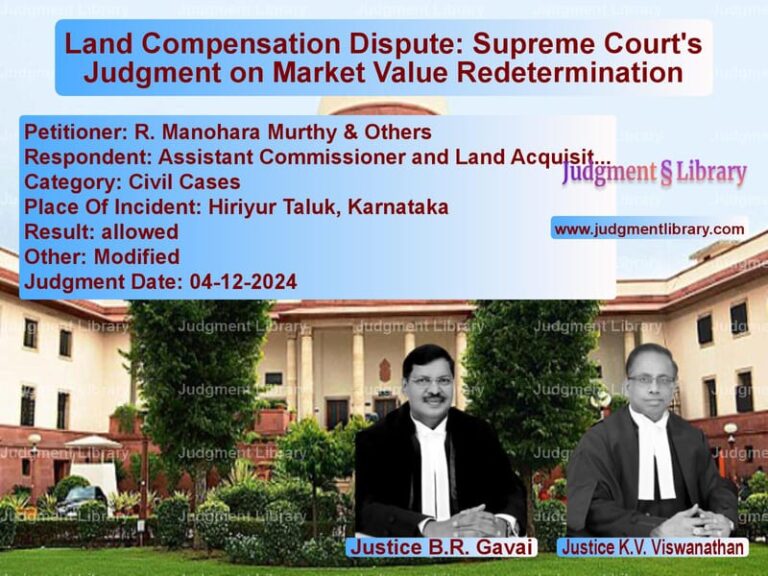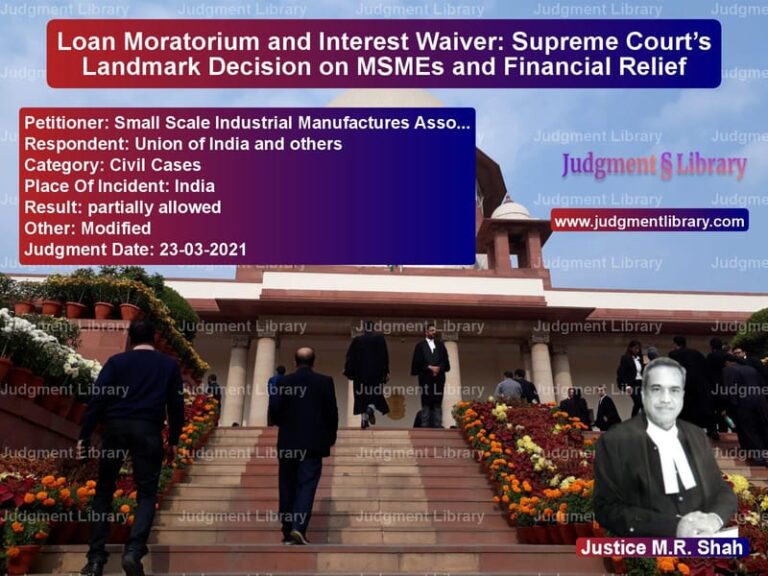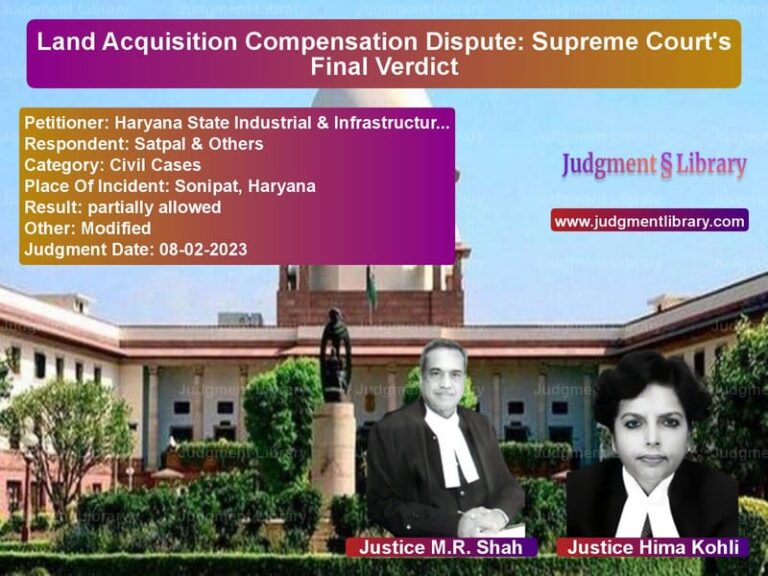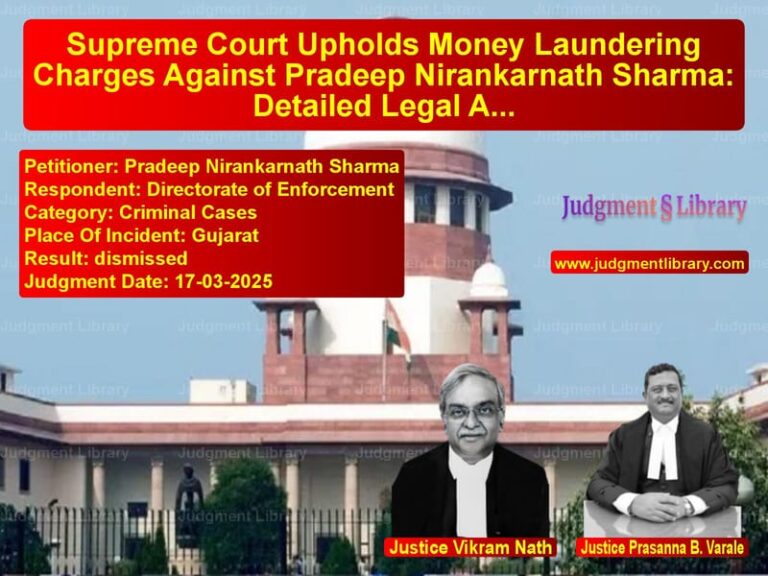Lok Adalat Awards and Land Compensation: Supreme Court’s Verdict Explained
The Supreme Court of India delivered a crucial judgment in the case of New Okhla Industrial Development Authority (NOIDA) vs. Yunus & Others, addressing whether an award passed by a Lok Adalat under Section 20 of the Legal Services Authorities Act, 1987, can be the basis for redetermination of compensation under Section 28A of the Land Acquisition Act, 1894. The case highlights significant legal issues concerning land acquisition, the role of Lok Adalats, and the rights of landowners seeking just compensation.
Background of the Case
The matter originated from a notification under Section 4(1) of the Land Acquisition Act issued on March 21, 1983, for the planned industrial development of villages in Tehsil Dadri, District Ghaziabad. The Land Acquisition Officer awarded compensation at a rate of Rs. 24,033 per bigha on November 28, 1984. The respondents (landowners) did not seek enhancement under Section 18 of the Act. However, one Fateh Mohammed filed a reference seeking higher compensation, which was taken up by a Lok Adalat. On March 12, 2016, the Lok Adalat awarded compensation at Rs. 297 per square yard, significantly higher than the initial Rs. 20 per square yard.
The respondents subsequently sought compensation redetermination under Section 28A of the Land Acquisition Act, arguing that the Lok Adalat’s award should serve as a benchmark. However, the Additional District Magistrate rejected their applications, stating that the Lok Adalat’s decision was based on compromise and not adjudication. The respondents then approached the High Court, which ruled in their favor, prompting NOIDA to appeal before the Supreme Court.
Arguments of the Petitioner (NOIDA)
- NOIDA contended that Section 28A of the Land Acquisition Act applies only when compensation is determined by a ‘Court’ under the Act. Since Lok Adalats merely facilitate settlements and do not adjudicate disputes, their awards cannot be the basis for redetermination.
- It was argued that the term ‘Court’ under the Land Acquisition Act refers specifically to a principal civil court or a specially designated judicial officer, excluding Lok Adalats from its scope.
- Legal fiction under Section 21 of the Legal Services Authorities Act, which treats a Lok Adalat award as a decree, does not imply that it qualifies as an adjudication under the Land Acquisition Act.
- Compensation awarded by the Lok Adalat was based on a compromise, not on a judicial determination considering evidence and legal principles.
- A divergence of judicial opinions exists on the issue, with some High Courts ruling in favor of NOIDA’s position.
Arguments of the Respondents (Landowners)
- The respondents, represented by senior counsels, argued that Section 21 of the Legal Services Authorities Act deems an award passed by a Lok Adalat to be a decree, thereby making it binding and enforceable like a court order.
- They contended that Section 28A was introduced to ensure that landowners who could not pursue claims earlier due to ignorance or financial constraints are not left at a disadvantage.
- It was emphasized that the Supreme Court should uphold the High Court’s ruling to maintain the objective of fairness and equality in compensation determination.
- The respondents argued that the Lok Adalat’s award was based on a prior High Court judgment, thus ensuring fairness in the amount awarded.
Supreme Court’s Judgment and Analysis
After carefully considering the arguments, the Supreme Court ruled in favor of NOIDA and overturned the High Court’s decision. The Court made several key observations:
- Nature of Lok Adalats: The Supreme Court reiterated that Lok Adalats are not courts but alternative dispute resolution mechanisms that facilitate compromises. They do not engage in adjudication based on evidence and legal principles.
- Definition of ‘Court’: The Court emphasized that the term ‘Court’ under Section 28A of the Land Acquisition Act specifically refers to a principal civil court or a designated judicial authority. Since Lok Adalats do not fit this definition, their awards cannot be treated as judicial determinations under the Act.
- Legal Fiction under Section 21: The Supreme Court clarified that while Section 21 of the Legal Services Authorities Act deems Lok Adalat awards to be decrees, this does not automatically make them judicial determinations under the Land Acquisition Act. The deeming fiction is intended solely for enforcement purposes.
- Compromise vs. Adjudication: The Court highlighted that Lok Adalat awards are based on mutual agreements and not on legal adjudication. As such, they lack the rigor of a court’s judgment, which assesses evidence and applies statutory principles.
- Implications for Section 28A: Since Section 28A allows landowners to seek compensation redetermination based on a judicially determined award, using a Lok Adalat’s compromise-based award would not fulfill the requirement.
Key Excerpts from the Supreme Court Judgment
The Court unequivocally stated:
“An Award passed by the Lok Adalat under the Legal Services Authorities Act is the culmination of a non-adjudicatory process. The parties are persuaded to arrive at a mutually agreeable compromise. The Award merely sets out the terms of that compromise. The deeming fiction under Section 21 is intended to clothe the Award with enforceability, but it does not equate it with an adjudicated order of a Court.”
The Court further observed:
“Section 28A of the Land Acquisition Act contemplates redetermination of compensation on the basis of an award passed under Part III of the Act. Such an award must be the result of a judicial adjudication, not a compromise. A Lok Adalat award, by its nature, lacks the adjudicatory rigor required under the Act.”
Final Verdict
The Supreme Court ruled that Lok Adalat awards cannot be used as the basis for seeking compensation redetermination under Section 28A of the Land Acquisition Act. It declared:
“Applications under Section 28A cannot be maintained on the basis of an award passed by the Lok Adalat under Section 20 of the Legal Services Authorities Act. The High Court’s judgment is set aside.”
The appeals were allowed, and the respondents’ claims for enhanced compensation based on the Lok Adalat award were dismissed.
Conclusion: Implications of the Judgment
This ruling has far-reaching implications:
- It clarifies the role of Lok Adalats in land acquisition cases, reinforcing that they facilitate settlements but do not engage in judicial adjudication.
- The judgment ensures that Section 28A of the Land Acquisition Act is applied only in cases where compensation is determined through formal judicial proceedings.
- It upholds the principle that legal fictions should not be stretched beyond their intended purpose, preventing misuse of Lok Adalat awards for claims not contemplated under the law.
The Supreme Court’s decision provides much-needed clarity on the interplay between Lok Adalat awards and land compensation laws, ensuring that judicially determined awards remain the benchmark for compensation redetermination.
Petitioner Name: New Okhla Industrial Development Authority (NOIDA).Respondent Name: Yunus & Others.Judgment By: Justice K. M. Joseph, Justice Pamidighantam Sri Narasimha.Place Of Incident: Ghaziabad.Judgment Date: 03-02-2022.
Don’t miss out on the full details! Download the complete judgment in PDF format below and gain valuable insights instantly!
Download Judgment: new-okhla-industrial-vs-yunus-&-others-supreme-court-of-india-judgment-dated-03-02-2022.pdf
Directly Download Judgment: Directly download this Judgment
See all petitions in Property Disputes
See all petitions in Landlord-Tenant Disputes
See all petitions in Damages and Compensation
See all petitions in Specific Performance
See all petitions in Contract Disputes
See all petitions in Judgment by K.M. Joseph
See all petitions in Judgment by P.S. Narasimha
See all petitions in allowed
See all petitions in Quashed
See all petitions in supreme court of India judgments February 2022
See all petitions in 2022 judgments
See all posts in Civil Cases Category
See all allowed petitions in Civil Cases Category
See all Dismissed petitions in Civil Cases Category
See all partially allowed petitions in Civil Cases Category

